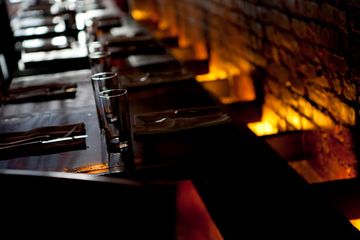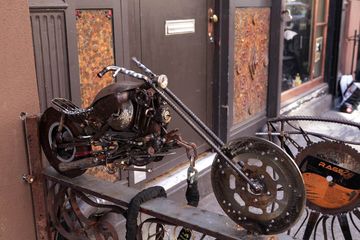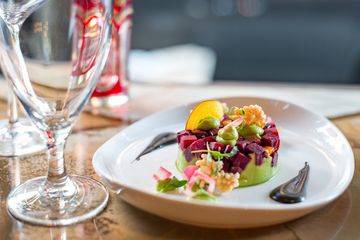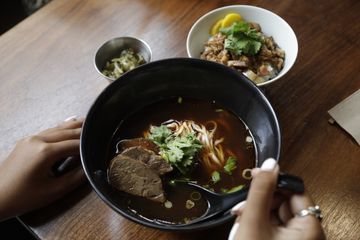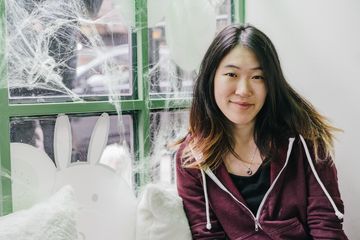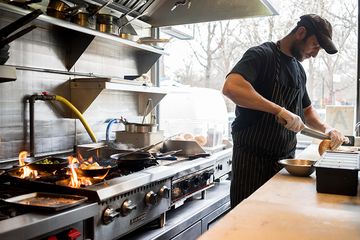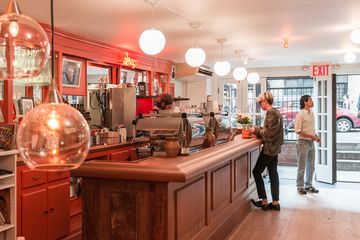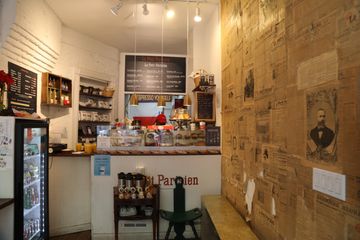I walked into Avant Garden and had the pleasure of sitting down with the owner himself, Ravi DeRossi. His name might seem familiar as he has become synonymous with trendy New York bars including Death and Co. and Amor Y Armargo on 6th Street. Avant Garden, a vegan restaurant that features only vegetables, is a jewel that he has added to his lengthy list of other establishments. Upon entering, the design was what captured my attention first. Every aspect is painstakingly selected by Ravi himself and this is hardly surprising given his background as a painter. He told me that he studied under his friend and mentor Igor Gorsky, an influential Greek painter in the abstract expressionist movement. Now, Ravi says, “opening bars and restaurants is my canvas. ”When I asked what was the recipe for his success, he said it was a lot of “dumb luck” and that he is “naturally suited to working a lot. ” In fact, he quoted Thomas Edison saying that it is “10% inspiration, 90% perspiration, ” and that his hard work has certainly gone a long way. Ravi opened his first business, Bourgeois Pig on East 7th Street (now on Macdougal), out of necessity. He was not making enough money as a painter to support himself. “I didn’t know how to do anything but paint and write, ” he said, and he loved to drink, so opening a wine bar seemed like a perfect plan. His idea was to use money from Bourgeois Pig to live off of and to paint in his free time. However, he found that it was “so much fun” running a wine bar that he kept on going. As for his other restaurants and bars, he told me, "I’ll be sleeping and something will come to my mind. ” These late-night inspirations have resulted in fifteen different places throughout New York and Brooklyn, as well as plans to open an Avant Garden in Los Angeles. The idea for a vegan restaurant has long been in the back of Ravi’s mind, inspired by a trip to a Buddhist Temple in India and his own on and off vegan lifestyle. In addition to opening Avant Garden, Ravi, a self-described “big animal rights guy, ” has jointly launched a non-profit called BEAST, which stands for Benefits to End Animal Suffering Today. Ravi only does things that he wants to do. His passion shines through every single detail of his restaurant, and he even went as far as saying that this is the place of which he is most proud. He is pleased with the fact that it is 100% cruelty free, “except to these guys, ” he said gesturing to the staff busily preparing the restaurant for that evening's diners. They all laughed. This is a place of great camaraderie, where there are none of the fake meats that are found at most vegan food spots, and the atmosphere is chic and warmly lit. When I was there, in the fall of 2015, the restaurant had only been open for about a month, and already Avant Garden had a crew of loyal followers, a testament to the menu. Its menu was created by Andrew D’Ambrosi, who moved to France after being Avant Garden's head chef during the restaurant's first few years. Ravi explained that he had originally found Andrew on Craigslist and hired him to work at his restaurant, Cienfuegos. When the itch came to open up a new place, Bergen Hill, in Brooklyn, Ravi began the search for a head chef. They used Andrew’s kitchen at Cienfuegos to test out the world-renowned chefs who wished to head the restaurant. Ravi shared with me that Andrew came to him and requested, "'Before you hire [anyone] let me make a tasting for you'... He blew thirty chefs out of the water. ” Andrew spent two years making vegan dishes at Bergen Hill and testing them as specials. "Each of his dishes is great, " Ravi proclaimed, adding "When I am at home, I dream of the Tomato Jam Toast. "
